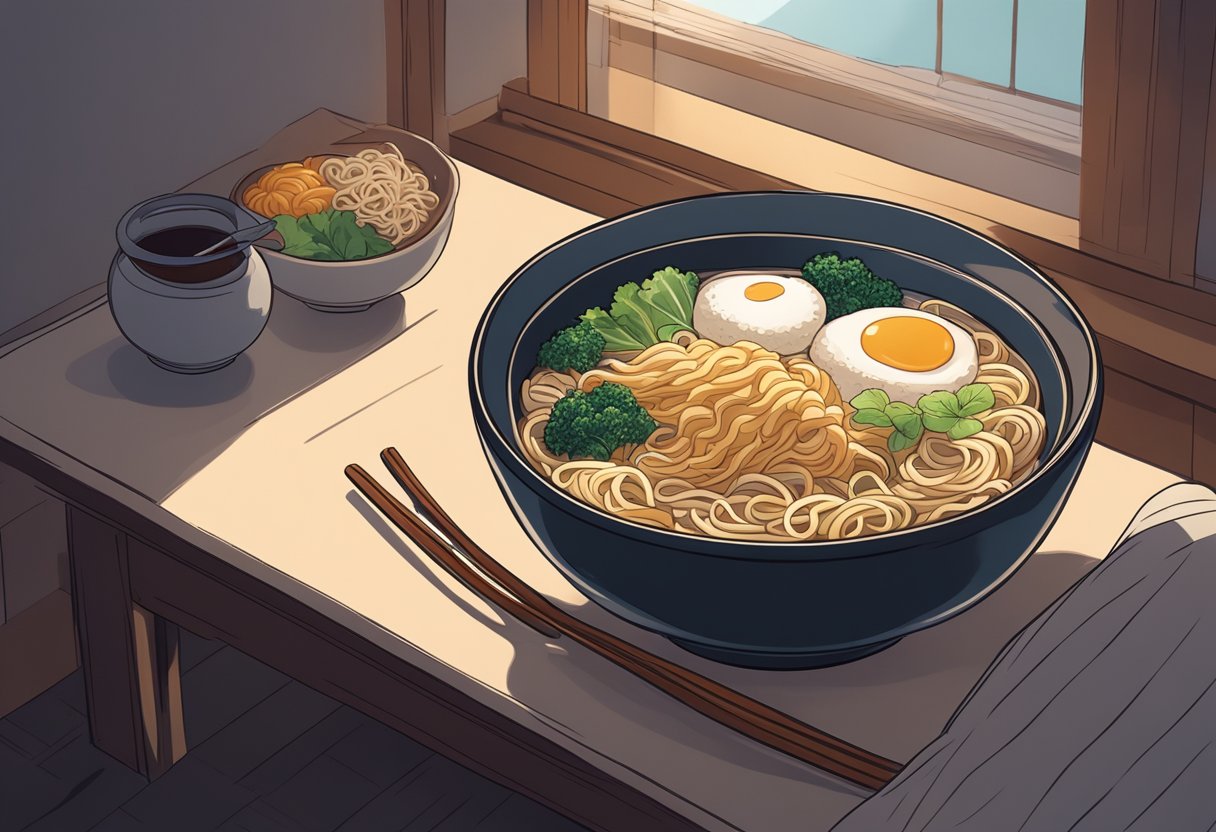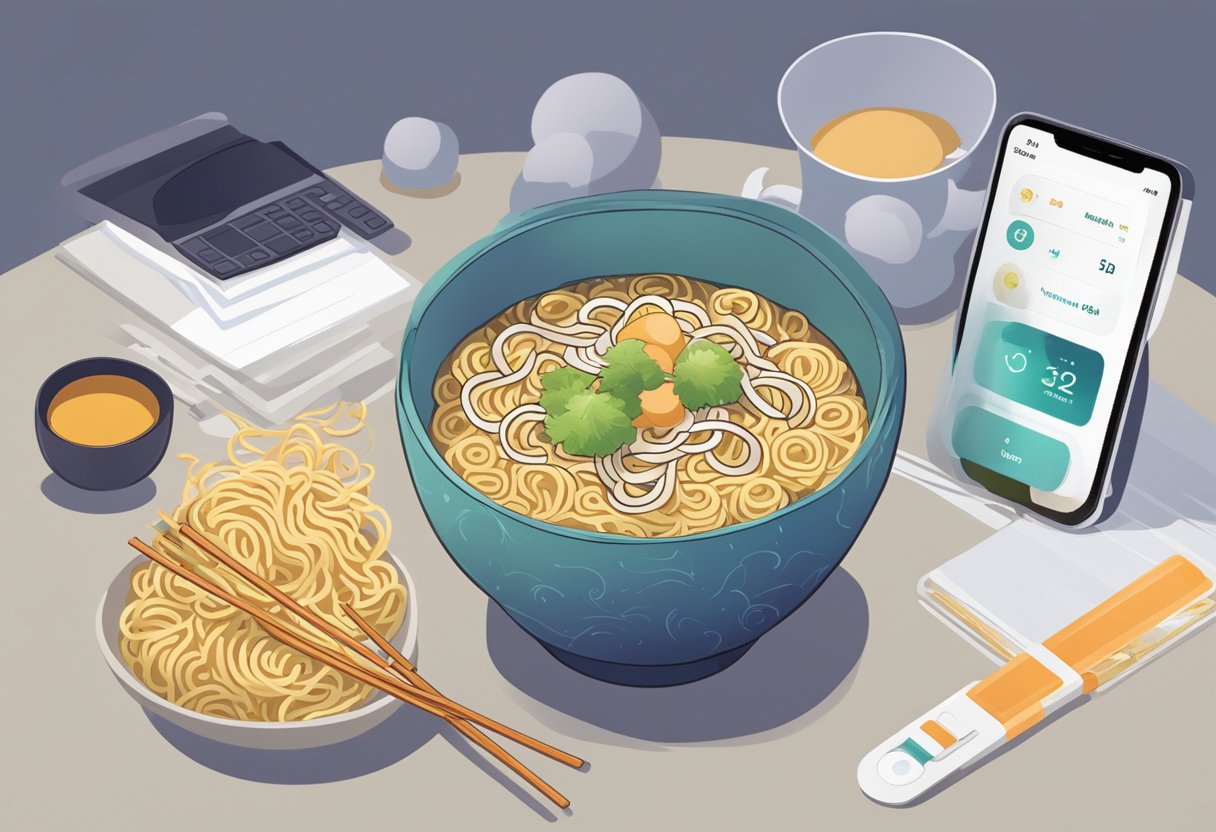How Does Ramen Affect Sleep? Unraveling the Surprising Connection
Ramen, a popular and convenient meal option, has become a staple in many diets due to its affordability and flavor variety. However, as a nutrition-conscious eater, you may wonder how consuming ramen might impact your sleep quality. To better understand the effects of ramen on sleep, it’s important to consider its nutritional profile and recognize the relevance of a balanced and healthy diet.

Ramen noodles are typically made from wheat flour, salt, water, and kansui, an alkaline mineral water that contributes to their characteristic texture. The packaged ramen we commonly find in grocery stores often contains artificial additives and high amounts of sodium in their seasoning packets. While there’s no direct evidence suggesting a causal relationship between eating ramen and poor sleep, examining the nutritional values and some common ingredients can provide us with insights on how ramen consumption might influence sleep patterns.
It’s important to remember that no single food can drastically affect sleep quality. However, certain factors like an overall healthy diet and other lifestyle choices play a significant role in achieving restorative sleep. Addressing the impact of ramen on sleep, and understanding its place in a balanced diet will allow you to make informed decision about your food choices, and ultimately benefit your sleep quality.
Key Takeaways
- Ramen’s high sodium content and artificial additives may have indirect effects on sleep quality
- No single food is solely responsible for poor sleep; factors such as lifestyle and overall diet play a role
- Understanding ramen’s nutritional profile and consuming it as part of a balanced diet is key to maintain sleep quality
Nutritional Profile of Ramen

Ramen Ingredients
Ramen is a popular Japanese dish made from wheat noodles served in a broth, often with various toppings. The key components of ramen are the noodles and the broth. Ramen noodles are typically made from wheat flour, water, and kansui, a type of alkaline mineral water. The broth can be made from various ingredients, such as pork bones, chicken, seafood, or vegetables.
Instant ramen, on the other hand, includes noodles that are pre-cooked and dehydrated, along with a seasoning packet. Common additives found in instant ramen are TBHQ (a preservative) and high levels of sodium.
Instant Ramen vs Fresh Ramen
| Nutrient | Instant Ramen | Fresh Ramen |
|---|---|---|
| Calories | 290 – 380 | 200 – 400 |
| Protein | 6 – 8g | 10 – 20g |
| Fiber | 1 – 2g | 2 – 4g |
| Vitamins & Minerals | Low | Moderate |
| Sodium | High | Moderate |
Instant ramen tends to be higher in calories, sodium, and preservatives than fresh ramen. Fresh ramen typically contains more protein, fiber, and vitamins and minerals due to the diverse ingredients used in preparing it. It is important to note, however, that the nutritional profile of ramen may vary depending on the specific recipe, ingredients, and portion size.
As for the effects of ramen on sleep, a diet high in sodium can contribute to poor sleep quality. A study found that subjects who consumed more sodium had fewer hours of sleep. Additionally, highly processed foods like instant ramen may impact sleep quality. However, more research is needed to determine the direct effects of ramen on sleep quality.
Ramen’s Impact on Sleep Quality
Sodium and Sleep Disruption
Ramen can be high in sodium, which may lead to disrupted sleep. High sodium intake has been linked to higher blood pressure, which in turn can negatively affect the quality of sleep. Consuming ramen or other high-sodium foods close to bedtime can interfere with the natural sleep cycle, leaving you feeling restless during the night.
On top of that, excessive sodium levels are associated with heart disease and obesity. Therefore, it is important to be mindful of the sodium content in your diet, not only for sleep quality but also for overall health.
Digestive Challenges of Ramen
Eating ramen close to bedtime may lead to digestive challenges, which could also impact your sleep. Typically, digestion slows down during sleep, and consuming a heavy meal late at night may cause discomfort or make it harder for your body to wind down.
Ramen often contains several additives such as MSG, which may cause digestive issues in some individuals. Moreover, the noodles are often made from refined flour, which can cause a spike in blood sugar levels, further hindering your ability to fall asleep.
In conclusion, although ramen is a delicious and satisfying meal, it may be best to avoid consuming it too close to bedtime. Choosing healthier, lower-sodium alternatives can provide similar flavors without putting your sleep quality at risk.
Health Considerations of Frequent Ramen Consumption
Association with Chronic Diseases
As a popular, quick meal, ramen noodles offer convenience but should be consumed with caution. Ramen has been linked to various chronic diseases, such as heart disease, diabetes, and metabolic syndrome. The potential risks arise mainly from its high sodium content, low nutritional value, and unhealthy additives. It is essential to understand these risks when considering sleep health.
I want to emphasize that the low nutritional value of ramen is another concern. It lacks essential vitamins, minerals, and fiber that our bodies need to function optimally. This deficit can contribute to the development of chronic diseases and affect our overall health and sleep quality.
Effects on Blood Pressure and Heart Health
The high sodium content of instant ramen noodles has been identified as a contributor to high blood pressure, thus increasing the risk of heart disease and stroke. This potential hazard is even more evident when people consume ramen regularly. Consequently, any long-term implications on heart health and blood pressure can directly impact an individual’s sleep and recovery.
Instant ramen usually contains added unhealthy ingredients, such as MSG and hydrogenated oils. These additives can also contribute to poor heart health and obstruct proper sleep. In essence, frequent consumption of ramen can affect not only your heart health but also your overall sleep quality.
Considering that sleep plays a vital role in the body’s restoration and recovery, it’s essential to be mindful of the potential health implications of regularly consuming ramen. Making healthier food choices and opting for nutrient-dense meals can significantly improve both our wellbeing and sleep quality.
Ramen as Part of a Balanced Diet
Incorporating instant ramen into a healthy diet may be a challenge due to its lack of nutrients. However, there are ways to make it a better meal option by increasing its nutrient value. This can be achieved by adding nutrient-dense foods to the ramen, resulting in a more balanced diet.
Incorporating More Nutrient-Dense Foods
Vegetables: Adding vegetables such as spinach, carrots, or mushrooms to the ramen can give it a nutrient boost. Vegetables provide vitamins, minerals, and fiber which help the body function optimally.
Fruits: Although not a common pairing with ramen, some fruits can be incorporated as a side dish to provide additional nutrients and a refreshing contrast to the meal. For example, a simple cucumber salad or a few slices of avocado can complement the savory flavors of ramen.
Grains & Seeds: Instead of relying on the standard noodles found in most instant ramen packets, opt for whole grain alternatives like brown rice noodles or soba. Additionally, you can sprinkle seeds like flax, chia, or sesame for an extra dose of fiber and healthy fats.
Beans, Nuts & Legumes: Add protein and nutrients to your ramen by incorporating beans, nuts, or legumes like edamame, chickpeas, or tofu. These are important sources of plant-based protein and beneficial nutrients.
Fish & Eggs: For a non-vegetarian option, you can boost the protein content of your ramen by adding fish like salmon or tuna, or simply topping it off with a cooked egg. Both options provide essential nutrients, such as omega-3 fatty acids and vitamin D found in fish, or B vitamins and choline in eggs.
By adding these nutrient-dense foods to ramen, you can create a more nutritious and balanced meal. Keep in mind that moderation and variety are crucial for maintaining a healthy diet, so try to create diverse meal plans that include a wide range of nutrient-rich options.
Alternatives to Traditional Ramen
Healthier Ramen Recipes
To make ramen healthier and possibly reduce its impact on sleep, I suggest incorporating fresh ingredients and wholesome options. One option is to create a homemade broth using natural herbs and spices. A homemade broth not only tastes better but also allows me to control the sodium content.
When it comes to noodles, I like to switch processed ramen noodles for whole grain noodles, which are higher in fiber and nutrients. Adding various vegetables, such as spinach, carrots, or mushrooms, can make the dish more nutritious and wholesome.
Substitutes for Instant Noodles
If I want to skip instant ramen altogether, there are several nutritious alternatives that satisfy my cravings for a warm, comforting meal. Some of my favorites include:
- Stir-fried veggies with whole grain noodles: Saute fresh vegetables in a bit of olive oil and add cooked whole grain noodles. Season with low-sodium soy sauce, garlic, and ginger for a tasty meal.
- Quinoa and vegetable stir-fry: A protein-packed alternative, quinoa is a good base for a veggie stir-fry. Cook quinoa according to package instructions and toss with stir-fried vegetables, herbs, and spices.
- Brown rice bowls: Brown rice is a filling, nutritious alternative to processed noodles. Top cooked brown rice with your choice of cooked vegetables, herbs, and spices, along with a protein source like tofu, chicken, or fish.
Switching from traditional instant ramen to healthier options may not only improve my sleep but also contribute to overall better health, due to the nutritious ingredients incorporated into these dishes.
FAQs
Can consuming ramen noodles before bedtime impact sleep quality?
Yes, consuming ramen noodles before bedtime may impact sleep quality due to their high sodium content, which can lead to dehydration and disrupt sleep. Additionally, the carbohydrates in ramen can cause fluctuations in blood sugar levels, affecting the quality of sleep.
Are there negative effects on sleep from eating ramen late at night?
Eating ramen late at night has some negative effects on sleep. The high sodium content can cause thirst and the need to urinate during the night, leading to sleep disruptions. Furthermore, the digestion process for high-carb and high-fat foods like ramen may affect the body’s ability to settle into a restful state.
What are the potential consequences of having instant noodles as a late night snack?
Instant noodles as a late night snack can lead to disrupted sleep due to their high sodium and carbohydrate content. This can cause thirst, increased urination, and fluctuations in blood sugar levels, which may result in poor sleep quality and grogginess the following day.
Does the high sodium content in ramen noodles affect sleep patterns?
Yes, the high sodium content in ramen noodles can affect sleep patterns by causing dehydration and increased thirst. This may lead you to wake up frequently during the night to drink water or use the restroom, disrupting your sleep cycle.
Are there any benefits or drawbacks to eating ramen before bed regarding sleep disruption?
There aren’t any notable benefits to eating ramen before bed regarding sleep disruption. However, there are drawbacks, such as increased thirst and disrupted sleep patterns due to the high sodium content and carbohydrate levels. It’s best to avoid heavy, high-sodium meals close to bedtime for optimal sleep.
How might the digestion process of ramen noodles influence sleep?
The digestion process of ramen noodles can influence sleep by causing discomfort or disrupting the body’s ability to enter a restful state. High-carb foods like ramen require more effort to digest, which can keep the body awake and active, potentially impacting sleep quality.